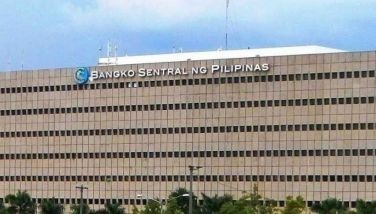Life insurance sector sees slower growth
October 18, 2001 | 12:00am
The life insurance industry is expected to grow by a slower eight to 10 percent this year as the economy continues to reel from the global economic slowdown.
Earlier, the industry was expected to grow by a stronger 12 percent to 14 percent. Last year the industry grew by 16 percent as total premiums reached P26.041 billion from P22.423 billion in 1999.
Insurance executives said that the reduction in the Filipinos disposable income has resulted in a drop in premium payments while delays have been experienced for existing policies.
Despite the difficult times, Ramon Abejuelar, president of the Philippine Life Insurance Association (PLIA) expects the industry to still register a double-digit growth this year. Abejuelar is also the executive vice-president of Insular Life and Assurance Corp.
"It will be beyond 10 percent growth but less than 14 percent," Abejuelar told The STAR, adding that the key factor for the reduction in growth forecast is the general economic slowdown. "Cash is king during the difficult and uncertain times."
He added the Sept. 11 terror attacks on the US would have little impact on the overall performance of the industry since the last quarter of the year is traditionally a "slow period."
Insurers with branches operating in Mindanao experienced a drop in new businesses due to the instability caused by the non-resolution of the Abu Sayyaf problem. Ongoing military operations plus the uncertainty caused by the threats of kidnapping or sabotage by Muslim terrorists has reduced business activities in the areas.
Meanwhile, Philippine American Life and General Insurance Co., (Philam Life) chief executive Jose L. Cuisia Jr., the Department of Education Culture and Sports (DECS) said they are planning to reduce the participation of insurance and other financial institutions in loans and life insurance policies of teachers.
"In the case of the teachers’ business, companies operating in the teachers business will also see a reduction in premiums as the DECS wants an increase in the net take-home pay of average teacher," Cuisia said.
The education department is looking at transferring teacher’s loans and insurance policies to the Government Security and Insurance System (GSIS).
Most of the lending institutions are charging from 14 to 18 percent salary deductions. The private institutions said that initial talks indicate that the government pension fund was not interested in the business as they would be forced to match the 14-percent deductions. "They prefer big ticket borrowings with higher yields rather than small earnings from a huge number of accounts like public school teachers."
"What we are saying is that it is not insurance that hurting them since the premiums are very low. It is the loans that they pay such as housing and the like where deductions reach nearly 60-75 percent per annum," Cuisia revealed. "For salary loans, we (Philam Life) deduct only 14 percent. In contrast, other lending institutions are charging much higher or almost twice what we charge. That is what the DECS should look into seriously."
Earlier, the industry was expected to grow by a stronger 12 percent to 14 percent. Last year the industry grew by 16 percent as total premiums reached P26.041 billion from P22.423 billion in 1999.
Insurance executives said that the reduction in the Filipinos disposable income has resulted in a drop in premium payments while delays have been experienced for existing policies.
Despite the difficult times, Ramon Abejuelar, president of the Philippine Life Insurance Association (PLIA) expects the industry to still register a double-digit growth this year. Abejuelar is also the executive vice-president of Insular Life and Assurance Corp.
"It will be beyond 10 percent growth but less than 14 percent," Abejuelar told The STAR, adding that the key factor for the reduction in growth forecast is the general economic slowdown. "Cash is king during the difficult and uncertain times."
He added the Sept. 11 terror attacks on the US would have little impact on the overall performance of the industry since the last quarter of the year is traditionally a "slow period."
Insurers with branches operating in Mindanao experienced a drop in new businesses due to the instability caused by the non-resolution of the Abu Sayyaf problem. Ongoing military operations plus the uncertainty caused by the threats of kidnapping or sabotage by Muslim terrorists has reduced business activities in the areas.
Meanwhile, Philippine American Life and General Insurance Co., (Philam Life) chief executive Jose L. Cuisia Jr., the Department of Education Culture and Sports (DECS) said they are planning to reduce the participation of insurance and other financial institutions in loans and life insurance policies of teachers.
"In the case of the teachers’ business, companies operating in the teachers business will also see a reduction in premiums as the DECS wants an increase in the net take-home pay of average teacher," Cuisia said.
The education department is looking at transferring teacher’s loans and insurance policies to the Government Security and Insurance System (GSIS).
Most of the lending institutions are charging from 14 to 18 percent salary deductions. The private institutions said that initial talks indicate that the government pension fund was not interested in the business as they would be forced to match the 14-percent deductions. "They prefer big ticket borrowings with higher yields rather than small earnings from a huge number of accounts like public school teachers."
"What we are saying is that it is not insurance that hurting them since the premiums are very low. It is the loans that they pay such as housing and the like where deductions reach nearly 60-75 percent per annum," Cuisia revealed. "For salary loans, we (Philam Life) deduct only 14 percent. In contrast, other lending institutions are charging much higher or almost twice what we charge. That is what the DECS should look into seriously."
BrandSpace Articles
<
>
- Latest
- Trending
Trending
Latest
Trending
Latest
Recommended




























